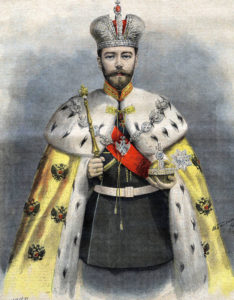
A portrait of Czar Nicholas II, published in a French newspaper in 1896. PHOTO: LEEMAGE/UIG/GETTY IMAGES
A hundred years ago, on March 14, 1917, just before midnight, the ministers of Czar Nicholas II informed him that the army was on the verge of mutiny. “What do you want me to do?” the Russian emperor reportedly asked. “Abdicate,” they replied. After a few minutes’ silence he agreed to go, thus bringing down the curtain on three centuries of Romanov rule. Continue reading…







